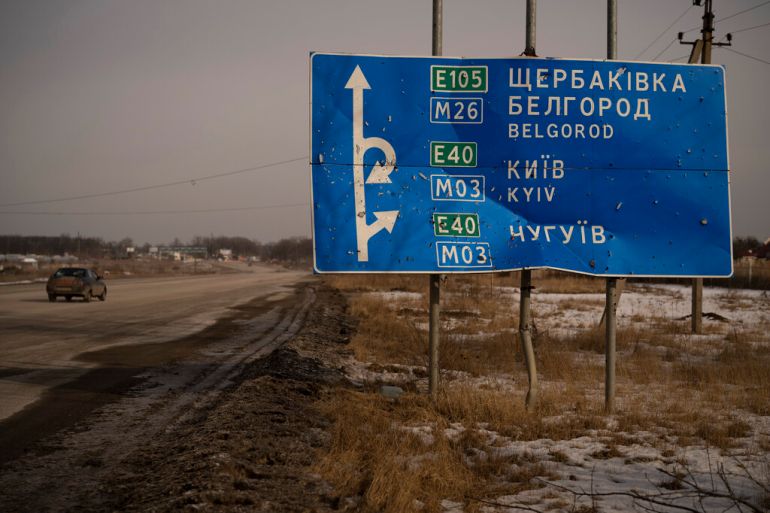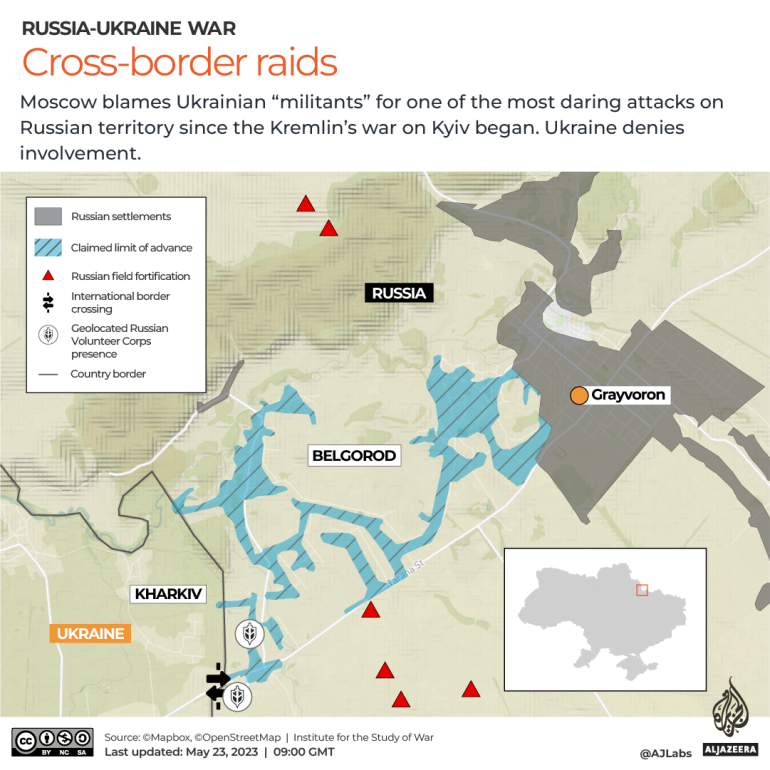Russian ‘clean up’ operation after raid on Belgorod from Ukraine
The Liberty of Russia Legion and Russian Volunteer Corps said to be involved in cross-border incursion in Russia’s Belgorod region.

Moscow’s forces are continuing to engage in operations against cross-border raiders – described alternatively as either armed Russian opposition groups or Ukrainian saboteurs – who entered Russia from Ukraine in one of the most daring attacks on Russian territory since the Kremlin’s war on Kyiv began 15 months ago.
The governor of Russia’s Belgorod region, Vyacheslav Gladkov, said on Tuesday that a “counterterrorism operation” was continuing against what he had earlier described as a Ukrainian “sabotage group” which had entered Russian territory in the Graivoron district bordering Ukraine.
Keep reading
list of 4 itemsRussia says F-16 transfer to Ukraine would raise NATO question
Russia-Ukraine war: List of key events, day 453
Ukraine still has a foothold inside Bakhmut, says official
The governor told residents who fled Graivoron that it was “not possible to return yet” to their homes.

“On the situation in the Graivoron district: the cleaning of the territory by the Ministry of Defence together with law enforcement agencies continues,” he said on the Telegram messaging app.
One woman has been killed and two people wounded but Russian forces have been unable to reach them, he added.
Ukrainian news broadcaster Hromadske, citing Ukrainian military intelligence sources, said on Monday that two armed Russian opposition groups, the Liberty of Russia Legion and the Russian Volunteer Corps (RVC), consisting of Russian citizens, were responsible for the attack on the Belgorod region.
Little is known about the groups or their ties with the Ukrainian military. The RVC was founded last August and reportedly consists mostly of anti-Putin far-right Russian fighters who have links with Ukrainian far-right groups.
Ukraine intelligence representative Andrii Cherniak also said Russian citizens were behind the cross-border assault.
Ukrainian President Volodymyr Zelenskyy’s adviser, Mykhailo Podolyak, said on Twitter that Ukraine had “nothing to do with it” and suggested that an “armed guerrilla movement” had emerged to oppose “a totalitarian country”.
“Ukraine is watching the events in the #Belgorod region of #Russia with interest and studying the situation,” he said.
The only driving political force in a totalitarian country of tightened screws is always an armed guerrilla movement. #Ukraine is watching the events in the #Belgorod region of #Russia with interest and studying the situation, but it has nothing to do with it. As you know, tanks…
— Михайло Подоляк (@Podolyak_M) May 22, 2023
Telegram channels monitoring Russia’s military activity, including the blog Rybar with more than a million subscribers, said buildings housing Russia’s interior ministry and the FSB security service had come under attack in the region’s main town, also known as Belgorod.
The RVC published video footage late on Monday on their Telegram social media channel which showed what the group said was a fighter inspecting a captured Russian armoured vehicle. Another video showed what it said were fighters operating an armoured vehicle on a country road inside Russian territory.
The Russian Volunteer Corps troops allegedly captured a Russian armored personnel carrier BTR82A during their incursion from Ukraine into Belgorod oblast, western Russia, on 22 May.
📹https://t.co/v8WEqm5bC9 pic.twitter.com/xsuvWLquGT— Euromaidan Press (@EuromaidanPress) May 23, 2023
Other videos posted on Russian and Ukrainian social media channels showed pictures and videos of what were described as captured Russian service members and their identity documents.
The Institute for the Study of War (ISW), a Washington, DC-based based think tank, said on Tuesday that two “all-Russian pro-Ukrainian” groups had crossed the border with tanks, armoured personnel carriers and other armoured vehicles, according to Russian sources.
Some military bloggers fixated on the fact that the invading units were comprised mostly of Russians, leading some to label them “traitors to Russia”, according to the ISW, while Wagner mercenary force boss Yevgeny Prigozhin blamed Russia’s defence ministry for being unable to defend the country’s borders.
2/ Russian sources reported on the morning of May 22 that a detachment of the RDK & LSR consisting of several armored vehicles crossed the international border & captured Kozinka, a settlement in the Grayvoron region of #Belgorod Oblast within 600m of the border with Sumy Oblast.
— ISW (@TheStudyofWar) May 23, 2023
News of the cross-border attack saw the Russian information space respond “with a similar degree of panic, factionalism, and incoherency as it tends to display when it experiences significant informational shocks”, the ISW said.
Kremlin spokesperson Dmitry Peskov said on Monday that Russian President Vladimir Putin had been informed and that work was under way to drive out the “saboteurs”, the state-run RIA Novosti news agency reported. An effort to “push them out from the Russian territory and liquidate them” was under way, he said.
Peskov described the action as an attempt by Ukraine to divert attention from the eastern city of Bakhmut, which Moscow claimed to have captured after months of battle but where Kyiv says it is still fighting.
Anton Gerashchenko, an adviser to Ukraine’s minister of internal affairs, posted several video clips from social media about the attacks and the groups involved in the incursion, including a video purportedly showing a Freedom of Russia Legion flag attached to balloons and reportedly flying in Moscow.
Russian media report that the buildings of FSB (Federal Security Bureau) and internal affairs ministry were under strike in Belgorod, Russia.
Reportedly, the buildings were attacked by drones. pic.twitter.com/rJrN4QKfg6
— Anton Gerashchenko (@Gerashchenko_en) May 22, 2023
The Telegram channel Baza, which has links to Russia’s security services, said there were indications of fighting in three settlements along the main road leading into Russia. The “Open Belgorod” Telegram channel said power and water had been cut off in several villages.
The Liberty of Russia Legion said on Twitter it had “completely liberated” the border town of Kozinka. It said forward units had reached the district centre of Graivoron, further east.
“Moving on. Russia will be free!” the group wrote.
The Legion and the RVC completely liberated n/a Kozinka, Belgorod Oblast. Forward units have entered Graivoron.
Moving on.
Russia will be free!
— "Liberty of Russia" Legion (@legion_svoboda) May 22, 2023
Early in March, the FSB reported an incursion from Ukraine into Russia’s Bryansk region. In videos circulating online at the time, armed men saying they belonged to the Russian Volunteer Corps said they had crossed the border to fight what they called “the bloody Putinite and Kremlin regime”.
The RVC was founded last August by Denis Kapustin, a Ukraine-based Russian nationalist, and announced on May 17 that it was joining forces with the Liberty of Russia Legion, which calls itself the Freedom of Russia Legion in English.
The group says it has made at least three incursions into the Bryansk region since March.